The overall landscape of sports cards continues to evolve from month to month and year to year. One aspect of the trading card hobby that continues to become more and more popular is sports card grading. This popularity increased with the entire new wave of sports card collectors and sports card investors that flocked to the hobby during the pandemic. A pandemic that shut down work, shut down school, shut down sports and even sports betting. As third-party grading grows, knowing which companies are the best and how they stack up. We will take a look at CSG VS SGC.

As CSG and SGC are both among the best sports card grading companies, the two are on different ends of the spectrum. SGC or has been around as nearly any of the top sports card grading companies including BGS and PSA. Whereas CSG or Certified Sports Guaranty is one of the new third-party grading companies within the market. Read on to learn more about both CSG and SGC as well as how they compete head-to-head CSG VS SGC.
If you are new to the hobby, read our other grading companies comparisons comparing BGS VS PSA, BGS VS SGC, BGS VS CSG, PSA VS SGC and PSA VS CSG.
CSG VS SGC Grading Guide
CSG VS SGC Grading Guide: What Sports Card Grading Company to Choose?
What is sports card grading?
Sports card grading is a process that allows sports card collectors an opportunity to have there sports cards receive a numerical graded based on a 1-10 grading scale. The collector submits the cards to a grading company such as CSG or SGC and pays a fee to have the card graded. The grading company in returns delivers a numerical grade to the card, then encapsulates the card before returning it to the collector. The higher the grade, the more collectible and valuable the sports card is.
Sports Card Grading Companies:
The quantity of sports card grading companies continue to increase each year as new sports card grading companies begin to enter the market. However, not all third-party grading companies are a like leaving sports card collectors to determine which grading card company is the best. A few of the top sports card grading companies include SGC, BGS, PSA and CSG. In addition, new Artificial Intelligence (AI) grading companies are slowly evolving the hobby.
Is it worth getting sports cards graded?
Understanding sports cards grading can be difficult and knowing which cards should be graded is something all sports card collectors should learn. As far as determining is it worth getting sports card graded, it all comes down to the actual card you are looking to have graded. Vintage cards such as the cards from before the 1970’s is highly collectible and valuable the higher the value of the cards. Other notable cards worth grading include autograph rookie cards, prospect cards, low numbered parallels, and other highly collectible inserts.
A second concept when determining whether a sports card is worth having graded is examining graded sports cards that have sold on eBay. Once you determine what the value of those cards are that you have, you can subtract the grading card fees charged by the various companies to see how the profit is. Below is an example to help you determine if it is worth getting a sports card graded.
2021 Trevor Lawrence Donruss Press Proof (Not exact sale prices)
PSA 10 Sold for $70
Ungraded 10 Sold for $20
PSA Fees $30
Profit from PSA 10 Sold $40
Outcome: In this case if the card grades a 10, you make an additional $20 profit
CSG VS SGC Grading Guide: Quick Look at CSG and SGC
One oof the major players in the grading card industry and a leader among the best sports card grading companies is SGC. SGC entered the industry in 1998 becoming one of the top vintage grading companies while jumping the ranks along with companies such as PSA and SGC. Over the years, SGC has graded millions of sports cards while delivering exceptional experiences for sports card collectors.
On the other side, CSG is one of the new players to the sports card grading landscape after arriving in February of 2021. That said, CSG’s parent company Certified Collectibles Group (CCG) has been in the industry of grading for a long-time delivering grades to paper money through Paper Money Grading (PMG), coin grading through NGC and even CCG for comic books and magazines.
CSG VS SGC Grading Guide: Comparing Elements of Sports Card Grading
Are you just learning about sports card grading? If so, understanding the concepts of sports card grading and the various elements of grading will help you determine what sports cards to grade and which ones not to grade. As you start to look at the various factors of sports card grading multiple aspects must be accounted for including grading card fees, grading card scale, and the comparable sales of cards between each company on eBay.
Here is a look at how CSG and SGC stack up against each other when comparing the various elements of sports card grading.
CSG VS SGC Grading Guide: Grading Scale
When looking at the sports card grading scale used in today’s sports card grading, most if not all the companies use the standard 1-10 sports card grading scale. This includes both CSG and SGC who grade their cards from 1-10 while also offering multiple grades for graded 10’s submitted.
Here is a look at CSG VS SGC grading scale.
CSG Grading Scale
Like SGC, CSG uses the 1-10 grading scale while also deliver .5-point increments for cards from 1.5 to 9.5. In addition, CSG offers both a Gem Mint (10) and a Perfect (10).
Poor (1)
Fair (1.5)
Good (2)
Good + (2.5)
Very Good (3)
Very Good + (3.5)
VG/EX (4)
VG/EX + (4.5)
Excellent (5)
Excellent + (5.5)
Ex/NM (6)
Ex/NM + (6.5)
Near Mint (7)
Near Mint + (7.5)
NM/Mint (8)
NM/Mint + (8.5)
Mint (9)
Mint + (9.5)
Gem Mint (10)
Perfect (10)
CSG Sportscard Graded Designations
Authentic – card is authentic and has not been altered (cut, trimmed, cleaned, recolored, or modified)
Authentic Altered – card is authentic and not reprinted, it has been altered).
Autograph Grades are assigned on a 5-10 grading scale.
SGC Grading Scale
SGC uses the standard 1-10 sports card grading scale while incorporating half point designations for every card value (1.5, 2.5, 3.5, etc.). In addition, SGC offers two variations of a graded 10 sports card the Gem 10 and the Pristine 10. The difference between the Gem 10 and the Pristine 10 is that the pristine 10 is flawless with a centering score at 50/50 while the Gem 10 has a centering score of 55/45 or better.
Poor (1)
Fair (1.5)
Good (2)
Good+ (2.5)
VG (3)
VG+ (3.5)
VG/EX (4)
VG/EX+(4.5)
EX (5)
EX+ (5.5)
EX/NM (6)
Ex/NM+ (6.5)
NRMT (7)
NM+ (7.5)
NM/MT (8)
NM/MT+ (8.5)
Mint (9)
Mint+ (9.5)
GEM (10 GM)
Pristine (10 PRI)
Advantage: PUSH, both offer very similar grades and offer better graded 10’s then a standard 10
CSG VS SGC Grading Guide: Grading Fees
A second element of sports card grading that is key to understand and know is the grading fees associated with both grading companies. You may ask yourself how much does it cost to have sports cards graded? Knowing how much it cost, could help you determine which company to use, especially if you are looking to sell the card. Here is a look at CSG grading card fees and SGC grading card fees:
CSG Grading Fees
Unlimited Walk Through (Unlimited Card Value) $150 + 1% FMV
Walk Through (Card Value $50,000) $150
Express ($10,000) $70
Standard ($1000) $35
Economy ($500) $25
Bulk (50-card minimum / Card Value $250) $15
CSG Additional Grading Fees
Autograph +$2
Pedigree (With Proper Documentation) +$5
CSG Thick Holder (For Thick Cards) +$5
Premium Hi-Res Imaging (Photos of Graded Card) +$5
SGC Grading Fees
Declared Value <$1,500 (20-25 EST Business Days) $30
Declared Value <$1,500 (1-2 EST Business Days) $125
Declared Value <$3,500 (20-25 EST Business Days) $85
Declared Value <$3,500 (1-2 EST Business Days) $125
Declared Value <$7,500 (1-2 EST Business Days) $250
Declared Value <$20,000 (1-2 EST Business Days) $500
Declared Value <$50,000 (1-2 EST Business Days) $1,000
Declared Value <$100,000 (1-2 EST Business Days) $2,000
Declared Value >$100,000 (1-2 EST Business Days) $3,750***
*** For each additional $10,000 over $100,000, an additional $375 is added to the base fee.
Advantage:
CSG VS SGC Grading Guide: Grading Time Frame
A third element that is key to when looking at the various grading companies is the turnaround time to have the card returned. For a sports card collector, longer times and cheaper costs is a plus. However, if you are a sports card investor or someone looking to flip sports cards for a profit, a company with shorter turnaround times may be key.
CSG Turnaround Times
Unlimited Walk Through 3 Days
Walk Through 3 Days
Express 7 Days
Standard 7 Days
Economy 10 Days
Bulk 20 Days
Autograph No additional Days/Same as above
Pedigree (With Proper Documentation) No additional Days/Same as above
CSG Thick Holder (For Thick Cards) No additional Days/Same as above
Premium Hi-Res Imaging (Photos of Graded Card) Same as Above plus 10 working days
SGC Turnaround Times
<$1,500 20-25 Business Days ($30 per card)
<$1,500 1-2 Business Days ($125 per card)
<$3,500 20-25 Business Days ($85 per card)
<$3,500 1-2 Business Days ($125 per card)
<$7,500 1-2 Business Days
<$20,000 1-2 Business Days
<$50,000 1-2 Business Days
<$100,000 1-2 Business Days
>$100,000 1-2 Business Days
*All turnaround times are estimated. In addition, SGC only offers longer and cheaper options to cards valued less than $1,500 (up to 25 days) and $3,500 (up to 25 days).
Advantage: CSG
CSG VS SGC Grading Guide: Graded Slabs & Graded Labels
CSG Slabs & Labels
CSG Perfect 10
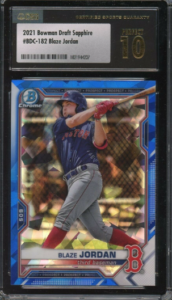
CSG Reverse Label
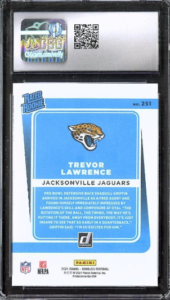
CSG Label (Not 10 or Perfect)
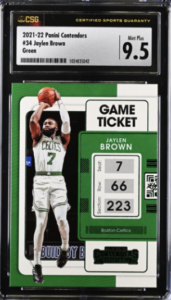
SGC Slabs & Labels
SGC Original Label (10-100 grading scale)

SGC New Label (1-10 grading scale)
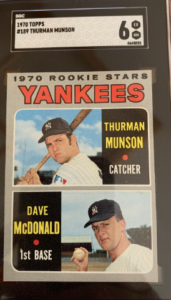
Advantage: CSG
CSG VS SGC Grading Guide: Comparing eBay Sales
The last element and possible the most important is how the cards are doing on various marketplaces graded. One major marketplace used to determine the market value of sports cards is eBay and their sold data. Using this information, sports card collectors can compare a specific card between the various companies such as CSG VS SGC to see what they are selling for. Then the sports card collector or sports card investor who is looking to sell the cards for profits, can use those values minus the grading card fees to determine their net profits.
Here is a look at two different cards from two different sports but the same graded value from CSG VS SGC:
CSG VS SGC Comparison eBay Comp Prices (CSG 10 VS SGC 10, CSG 5 VS SGC 5)
2019 Panini Prizm Kyler Murray CSG 10 VS SGC 10
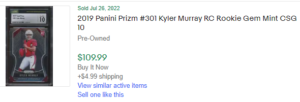
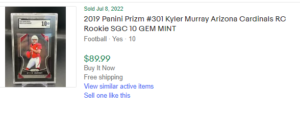
1970 Topps Nolan Ryan CSG 5 VS SGC 5
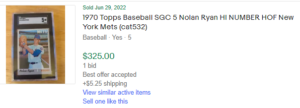

SGC VS CSG Comparison eBay Profit Breakdown
1970 Topps Nolan Ryan CSG 5
eBay Sold Price $155.60
CSG Fees $25
Total Profit $130.60
1970 Nolan Ryan SGC 5
eBay Sold Price $325
SGC Fees $30
Total Profit $295
2019 Panini Prizm Kyler Murray CSG 10
eBay Sold Price $109.99
CSG Fees $25
Total Profit $84.99
2019 Panini Prizm Kyler Murray SGC 10
eBay Sold Price $89.99
SGC Fees $30
Total Profit $69.99
Advantage: Push (Vintage towards SGC, Modern towards CSG)
CSG VS SGC Grading Guide: Our Thoughts on SGC VS CSG
Now that you had the opportunity to read about CSG and SGC, here is our thoughts on CSG VS SGC. When it comes to vintage sports cards, SGC is the leader in the industry with many sports card collectors or sports card investors electing to use them for these types of cards. In addition, the longevity, and the bump in value of the cards gives the slight advantage to SGC. However, CSG is slowly emerging among the industry and continues to grow in popularity.
Take the time to do your math based on these comp sales and fees to have card graded, while seeing which option is best for you. With that said, it is nearly impossible to determine what the sports grading landscape will be in the future. For now, though CSG and SGC both look to be at the front of the pack.
[ Grade your cards with AI in real-time >> https://bit.ly/3SMSfxV ]




Leave a Reply